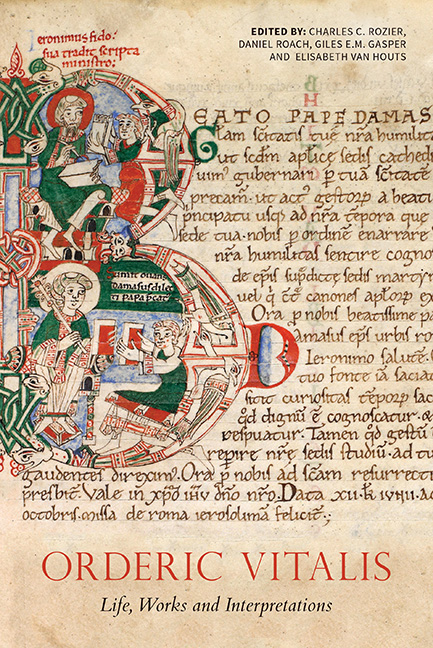Book contents
- Frontmatter
- Dedication
- Contents
- List of Illustrations
- Acknowledgements
- List of Abbreviations
- Chronology of the Lives of Odelerius and his Son Orderic Vitalis
- Composition of the Historia ecclesiastica
- Introduction: Interpreting Orderic Vitalis
- Orderic and his Father, Odelerius
- Following the Master's Lead: The Script of Orderic Vitalis and the Discovery of a New Manuscript (Rouen, BM, 540)
- Orderic Vitalis as Librarian and Cantor of Saint-Évroul
- Saint-Évroul and Southern Italy in Orderic's Historia ecclesiastica
- Orderic and English
- Inscriptions in Orderic's Historia ecclesiastica: A Writing Technique between History and Poetry
- Reading Orderic with Charters in Mind
- Orderic Vitalis and the Cult of Saints
- Orderic's Secular Rulers and Representations of Personality and Power in the Historia ecclesiastica
- Worldly Woe and Heavenly Joy: The Tone of the Historia ecclesiastica
- Orderic Vitalis, Historical Writing and a Theology of Reckoning
- Jesus Christ, a Protagonist of Anglo-Norman History? History and Theology in Orderic Vitalis's Historia ecclesiastica
- ‘Studiosi abdita investigant’: Orderic Vitalis and the Mystical Morals of History
- Meanders, Loops, and Dead Ends: Literary Form and the Common Life in Orderic's Historia ecclesiastica
- Orderic and the Tironensians
- ‘One single letter remained in excess of all his sins …’: Orderic Vitalis and Cultural Memory
- The Reception of Orderic Vitalis in the Later Middle Ages
- Appendix 1 Archaeological Investigations at the Abbey of Saint-Évroult-Notre-Dame-des-Bois
- Appendix 2 Descriptive Catalogue of Manuscripts Featuring the Hand of Orderic Vitalis
- Select Bibliography
- List of Manuscripts Cited
- General Index
Orderic Vitalis, Historical Writing and a Theology of Reckoning
Published online by Cambridge University Press: 25 October 2017
- Frontmatter
- Dedication
- Contents
- List of Illustrations
- Acknowledgements
- List of Abbreviations
- Chronology of the Lives of Odelerius and his Son Orderic Vitalis
- Composition of the Historia ecclesiastica
- Introduction: Interpreting Orderic Vitalis
- Orderic and his Father, Odelerius
- Following the Master's Lead: The Script of Orderic Vitalis and the Discovery of a New Manuscript (Rouen, BM, 540)
- Orderic Vitalis as Librarian and Cantor of Saint-Évroul
- Saint-Évroul and Southern Italy in Orderic's Historia ecclesiastica
- Orderic and English
- Inscriptions in Orderic's Historia ecclesiastica: A Writing Technique between History and Poetry
- Reading Orderic with Charters in Mind
- Orderic Vitalis and the Cult of Saints
- Orderic's Secular Rulers and Representations of Personality and Power in the Historia ecclesiastica
- Worldly Woe and Heavenly Joy: The Tone of the Historia ecclesiastica
- Orderic Vitalis, Historical Writing and a Theology of Reckoning
- Jesus Christ, a Protagonist of Anglo-Norman History? History and Theology in Orderic Vitalis's Historia ecclesiastica
- ‘Studiosi abdita investigant’: Orderic Vitalis and the Mystical Morals of History
- Meanders, Loops, and Dead Ends: Literary Form and the Common Life in Orderic's Historia ecclesiastica
- Orderic and the Tironensians
- ‘One single letter remained in excess of all his sins …’: Orderic Vitalis and Cultural Memory
- The Reception of Orderic Vitalis in the Later Middle Ages
- Appendix 1 Archaeological Investigations at the Abbey of Saint-Évroult-Notre-Dame-des-Bois
- Appendix 2 Descriptive Catalogue of Manuscripts Featuring the Hand of Orderic Vitalis
- Select Bibliography
- List of Manuscripts Cited
- General Index
Summary
Orderic Vitalis does not present his Historia ecclesiastica, or for that matter his additions to William of Jumièges, as works of theology or of obvious theological interest. Indeed he indicates on occasion that he saw his work in a very different light, though he did so perhaps more as a reflection on his times than by his own inclination. Towards the beginning of Book V, written about 1128, Orderic recounts the appetite of his fellow monks for the history of their own house and their reluctance to set any of it down in writing:
They were only too willing to read the deeds of their abbots and of the brethren of their house, and to learn of the building of its modest property, first given by its poor but pious founders and patiently augmented by the continual care of its father abbots; but they shrank from bending their minds to the task of composing or writing down their traditions.
This record Orderic set himself to complete, as far as he was able. A significant disappointment in this process, if not an impediment, was the deterioration he observed in the behaviour of his contemporary society:
The altercations of prelates and bloody wars of princes provide more material for the historian's pen than the treatises of theologians or the fasts and prophecies of ascetics.
In these prefatory remarks Orderic contrasts the abundance of miracles performed through God's will by the Fathers of older times, and the plentiful record of these miracles in books, with the spiritual decadence and poverty of his own time. Miracles have dried up, and been replaced by ‘a growing frenzy of vices in those who give themselves up to fleshly lusts’, which was taken to indicate the proximity of the time of Antichrist. Theological treatises might be better and more useful material for a writer to set down for posterity, but Orderic is confined to what he has at his disposal: history will have to suffice.
The theological revolution of the later eleventh and twelfth centuries was well underway during the course of Orderic's writing career. However, its appearance within Orderic's narrative is patchy.
- Type
- Chapter
- Information
- Orderic Vitalis: Life, Works and Interpretations , pp. 247 - 259Publisher: Boydell & BrewerPrint publication year: 2016

